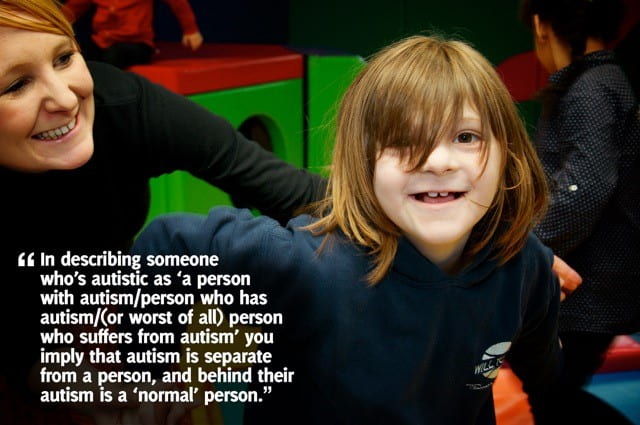Watch your language: talking about autism
By Blog Editor, IOE Digital, on 13 July 2015

Liz Pellicano
Words matter. The way we use them to communicate with or about others can have a huge impact on people’s lives. This is especially the case when it comes to disability. Handicapped. Retarded. Mad. Activists have campaigned hard to eradicate such terms, which are offensive and perpetuate a negative view of disabled people – one as passive, unable to take control over their own lives.
Responding to this demand, recent government guidelines have encouraged clinicians and teachers to use positive and inclusive language, including the use of language that does not define people by their disability. “Person-first” language has become the call: that is, calling someone a ‘person with autism’, for example – describing what a person has, not what a person is. This has become the recommended way to speak with or about disability – in the press, journal articles, hospitals and schools.
It is difficult not to see the good intentions behind this call. But is it really as inclusive as it claims to be? Perhaps not.
Many disabled people have argued vehemently against the use of “person-first” language, instead preferring “disability-first” language (e.g., autistic person). Nowhere is this issue more hotly debated than the field of autism. Many autistic activists argue that person-first language is dehumanising, as if they can somehow be separated from their autism, that there is a ‘typical’ person affected by autism, rather than a person whose life is in part defined by being autistic.
These are difficult questions. But it is surely not difficult to argue that truly inclusive language should be defined by the people who are #actuallyautistic. Not by well-meaning outsiders, no matter how powerful.
Recently, together with the National Autistic Society, my colleagues and I asked 3,470 members of the UK autism community, including autistic people, parents and their broader support network, about the words they use to describe themselves, their children or the people with whom they work. Did they prefer to use “autistic person”? Or “person with autism”? Or “person who has autism”?
The results clearly showed that people use many terms when talking about autism. The words ‘autism’ and ‘on the autism spectrum’ were clear favourites among all the groups added together. But there was much disagreement on the use of several words and phrases. Professionals preferred to use ‘person with autism’ while autistic adults and family members preferred on the whole to use ‘autistic’. They thought that the term allowed them to describe the centrality of autism to their lives. One autistic woman said, “In describing someone who’s autistic as ‘a person with autism/person who has autism/(or worst of all) person who suffers from autism’ you imply that autism is separate from a person, and behind their autism is a ‘normal’ person.”
But these preferences were not unanimous, of course. Instead, for autistic people, family members and professionals, the words they used often hinged on what people believed autism to be. Those who felt that autism is one trait of many in a person tended to prefer person-first language. Others, who felt that autism is central to their or their child’s identity, opted to use ‘autistic’. Others still noted the need to use different words depending on whom one is speaking to.
There is no one way of describing autism on which everyone can agree. There never will be. Who, then, gets to decide which terms should be used? Where should we start?
The answer, I believe, lies in two ways. First, everyone connected to autism needs to come to accept the fact of disagreement and to respond to it with openness, flexibility and tolerance of divergence of opinion. We should always seek to establish how people wish to be described – by asking them directly, if possible – and not impose external views upon them. Second, and perhaps even more importantly, we need to create the conditions for debate and conversation between all of the people who make up the broad autism community. It is, after all, only when we listen to each other that we discover what individual words are taken to mean and why they often matter so much.
Read the full paper here.
Listen to an accompanying podcast here.
2 Responses to “Watch your language: talking about autism”
- 1
-
2
The Reading Room | Access Magazine wrote on 17 July 2015:
[…] – Liz Pellicano, Reader in Developmental Cognitive Science at University College London, pens a thoughtful blog post about the language we use to talk about autism. […]
 Close
Close




It’s just the difference between a word……for goodness sake there are more things to gripe about than a word…..for instance why isn’t there more research going on into autism.